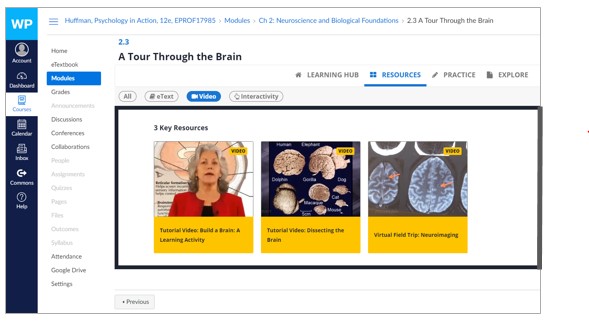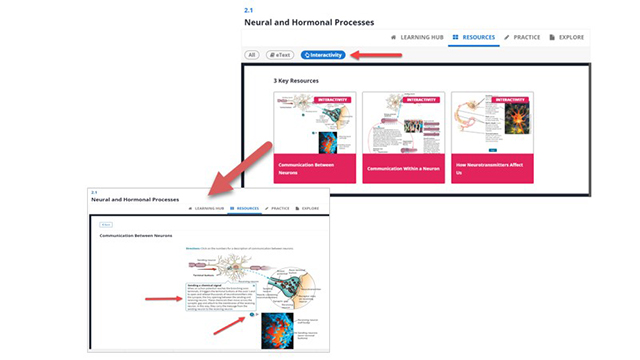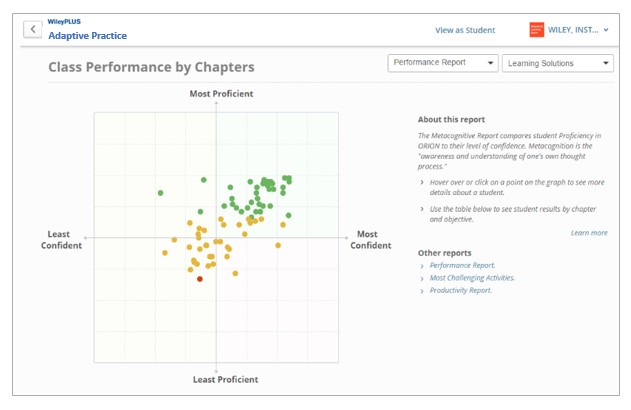
Psychology in Action, 12th Edition
By Karen Huffman, Katherine Dowdell, and Catherine A. Sanderson
Psychology in Action has been designed to engage and inspire your students through its streamlined, linear organization and the authors’ unique active learning approach. Students will leave the course with a solid foundation in basic psychology that will serve them in their daily lives no matter what their chosen field of study and career path.
The next generation of WileyPLUS gives you the freedom and flexibility to tailor your introductory psychology content and easily manage your course in order to keep students engaged and on track. Psychology in Action is available in the new WileyPLUS platform, offering students a wealth of tools that will empower them to master and make connections between the key concepts of the course. Rich media content, including new interactive graphics, tutorial animations, videos, and virtual field trips, is integrated at the learning objective level providing students with a clear and engaging path through the material.
Schedule a Demo
Sign Up for a Test Drive
Adopt WileyPLUS
Listen to what instructors and students are saying about WileyPLUS and how it has had a positive effect on their learning outcomes:
“Learning outcomes in my class have been improved by students spending more ‘quality’ time with the material in WileyPLUS addition to merely reading.”
– Chaelle Norman, Instructor, Richland College
“I believe WileyPLUS adaptive practice has been instrumental in improved learning outcomes.”
– Tiffany Thomas, Instructor, Des Moines Area Community College
“I got 72% on my first test and thought that was okay, but then I practiced with the adaptive practice in WileyPLUS and I got 90% on my next test!”
– Chloe C., Student, Vanier College
Tutorial Videos and Virtual Field Trips connect concepts to real life
Tutorial videos and virtual field trips to real places engage students in an active learning experience and appeal to a variety of learning styles. Instructors can assign related quizzes to test student understanding.
Challenging concepts are illustrated for students
Animations that illustrate difficult-to-learn concepts from a real-world perspective are included within the module where the topic is being discussed.
New interactive graphics engage all types of students
Interactive graphics engage students with illustrations and diagrams that help them actively explore and better understand complex concepts.
Adaptive Practice
Every student has a different starting point, and adaptive practice provides endless opportunities for practice to effectively prepare for class or quizzes and exams. Active retrieval of information with practice questions is proven to improve retention of information better than re-reading or reviewing the material, and students who use adaptive practice to prepare for exams do significantly better than those who do not. Students begin with a quick, section-level diagnostic to determine their initial level of understanding, and they can use the dashboard and quick reports to see what topics they know and don’t know.
Features Include
- Application Quiz: These pre-created applied quizzes allow instructors to quickly assign a short set of multiple-choice questions that test students’ ability to apply the material they have just learned.
- Support for Developing Critical Thinking Skills: A special critical thinking prologue and structured exercises throughout each course section provide the scaffolding and framework for students to develop their critical thinking skills. Connections questions in each end-of-section Retrieval Practice activity strengthen students’ grasp of concepts and ability to relate concepts from one course section to another and to the seven major perspectives of psychology.
- Opportunities to Connect Concepts to Real Life: Why Study Psychology? and Try This Yourself features are among the many opportunities each course section provides for students to make connections between the concepts they’re learning and their everyday lives.
- Media Challenge: This evidence-based feature shows students how to use critical thinking to evaluate psychology-related topics in popular internet blogs and social media.
- Looking Back/Looking Ahead: These sections appear throughout the course and allow students to see the interrelated connections from key concepts across course sections.
What’s New
- APA Undergraduate Learning Goals and Outcomes 2018: For instructors, the test bank now has APA tagging and can be filtered by goals and outcomes.
- Grit and a Growth Mindset: Studies find that “grit” and a “growth mindset” may be even more important than IQ in determining individual success in work and academic settings. Each course section begins with a brief description of a famous figure who exemplifies both qualities and then references these stories later in the section to illustrate core concepts. The repeated stories of success reassure students that achievement is largely under their control and thereby inspires them to use grit and a growth mindset to achieve their own personal dreams and aspirations. Each course section includes a Psychology and a Contemporary Success or a Psychology and a Classical Success story.
- Personal and Professional Success: The course also includes two new features—Psychology and Your Personal Success in every section and Psychology and Your Professional Success in most sections—to further demonstrate how knowing psychology, along with a growth mindset and grit, can help students succeed in the real world.
- New Animations, Tutorial Videos, and Mini-Courses: A variety of the animations and video tutorials included in this course are new. This course now also features video Mini-Courses to support students in learning complex topics.
- Introduction and Research Methods
- Neuroscience and Biological Foundations
- Stress and Health Psychology
- Sensation and Perception
- States of Consciousness
- Learning
- Memory
- Thinking, Language, and Intelligence
- Life Span Development I
- Life Span Development II
- Gender and Human Sexuality
- Motivation and Emotion
- Personality
- Psychological Disorders
- Therapy
- Social Psychology
Optional Sections:Industrial/Organizational Psychology
Psychology at Work in the Global Economy








